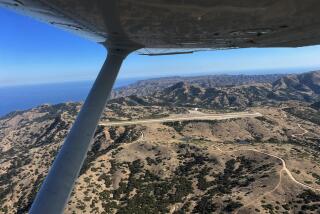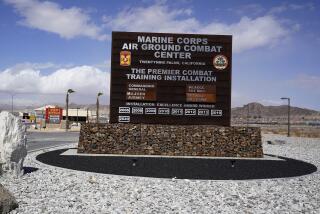Marine Who Took Jet Described as Dedicated by Neighbors, Friends
- Share via
As he sat in a jail-like cell Saturday at Camp Pendleton after taking a joy ride in a Marine Corps jet from El Toro, 21-year-old Lance Cpl. Howard A. Foote Jr. was described by friends and neighbors as a dedicated, patriotic man known to them as “Buddy.”
Retired Navy commander Don Davis of Long Beach, who helped Foote become an expert glider pilot and saw him solo six years ago on his 15th birthday, said his former student is an “ambitious, talented, motivated kid who was born to fly. . . . He would eat, sleep and talk flying. All he ever wanted to do, ever since he started out, was to be a fighter pilot.”
Investigation Under Way
Meanwhile, military investigators continued their probe of how and why the enlisted flight mechanic took an unarmed A-4M Skyhawk jet from the El Toro Marine Corps Air Station at 2 a.m. Friday and flew for about 30 minutes.
Authorities said it would be Monday or later before they set a date for a preliminary disciplinary hearing on charges of wrongful appropriation of a government aircraft and before they receive results of blood and urine tests to determine if Foote had alcohol or drugs in his system at the time of the incident.
A former Explorer Scout and member of the Long Beach Soaring Club who grew up in Los Alamitos, Foote is a polite, earnest young man, neighbors said.
Hard Work Told
And acquaintances said he had worked hard to prove wrong several teachers and counselors who had told him over the years that training to become a jet pilot would be too difficult for him.
Former neighbor Nancy McBride said that Foote “is one of the nicest, most polite, kind and wonderful persons you’d ever meet. We’ve known him for at least 10 years and we really admired Buddy--that’s what we and everybody else called him. Buddy was very dedicated. What’s happened is really a tragedy for him. He was devoted to his work and his country. He must have flipped out or something. He really wanted to be a pilot so badly. He tried so hard.”
Assigned to the maintenance of visiting aircraft at El Toro, Foote had hoped to be accepted into the Marine Corps’ Enlisted Commissioning Program, with the ultimate goal of attending flight school. However, Foote suffered an aerial embolism, similar to the “bends,” during a glider flight and found out that the incident would probably make him ineligible for Marine Corps flight status.
“He was probably very despondent over that,” McBride said. “He loves to fly. That’s what he cared about most.”
Chase Ruled Out
Meanwhile, base officials said a decision was made not to chase Foote because a sentry had recognized him and assumed he would return with the aircraft. Also, no pilots were on duty at the time, officials said, something that is not unusual in predawn hours unless the base is on special alert or involved in a military exercise.
All flight operations, including the runways, had been closed for the night, officials said, and Foote took off in almost total darkness.
“He would have been tracked on one of the regional radar systems, but had he decided not to come back, we would have lost an airplane,” said Sgt. Peg Cauley, a public information officer at the base. During Foote’s flight, Pentagon officials at least as high as the commandant of the Marine Corps were notified.
Would Have Done Something
Lt. Tim Hoyle, another public information officer, said chances are that somebody would have done something eventually. “We would have taken action,” Hoyle said, “but what it would have been, I don’t know.”
Hoyle said there is no evidence so far that Foote, who had received flight simulator training and was an award-winning, record-setting glider pilot, had help from fellow Marines. Hoyle declined to specify what security measures are supposed to be followed by base personnel if an aircraft is stolen. He said security is being tightened at the base, but added that he is not allowed to discuss details.
Hoyle said that if Foote had kept flying, he wouldn’t have been able to get beyond Mexico without refueling.
“If he kept going, he would have run out of gas,” Hoyle said.
More to Read
Sign up for Essential California
The most important California stories and recommendations in your inbox every morning.
You may occasionally receive promotional content from the Los Angeles Times.










